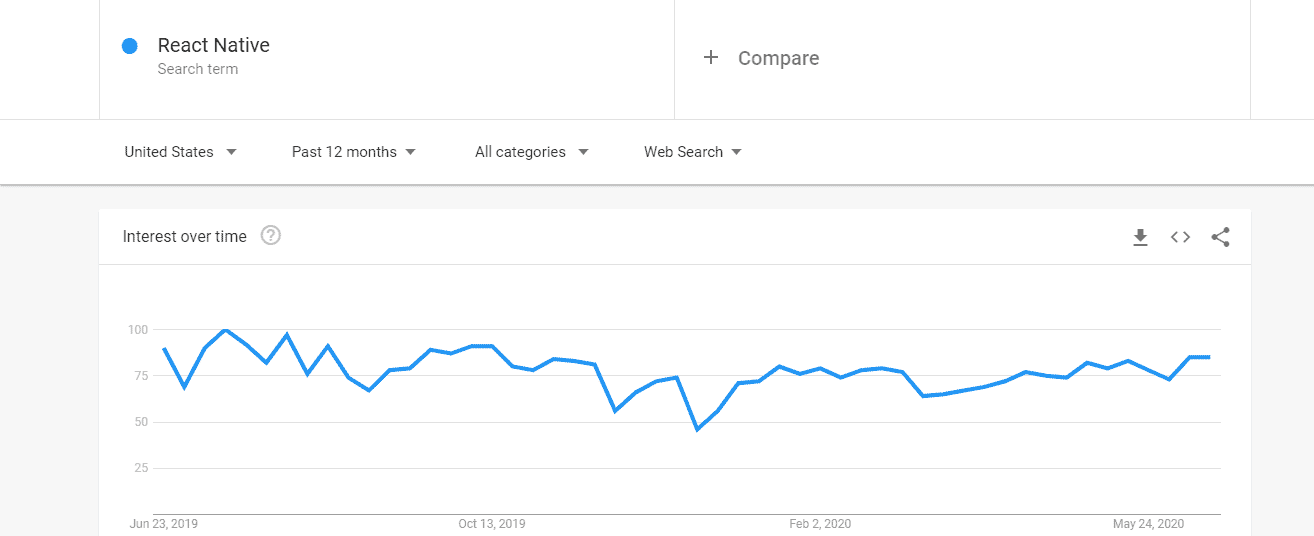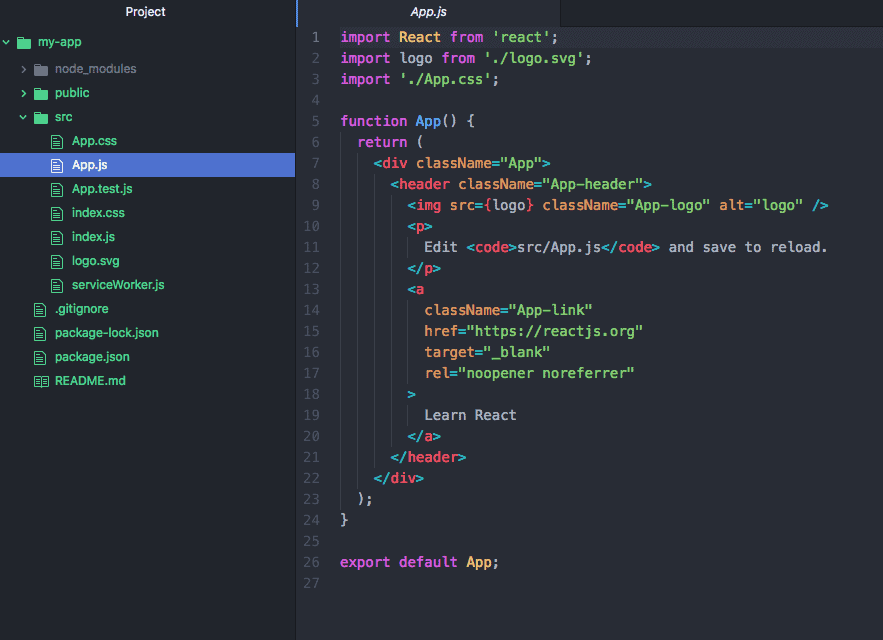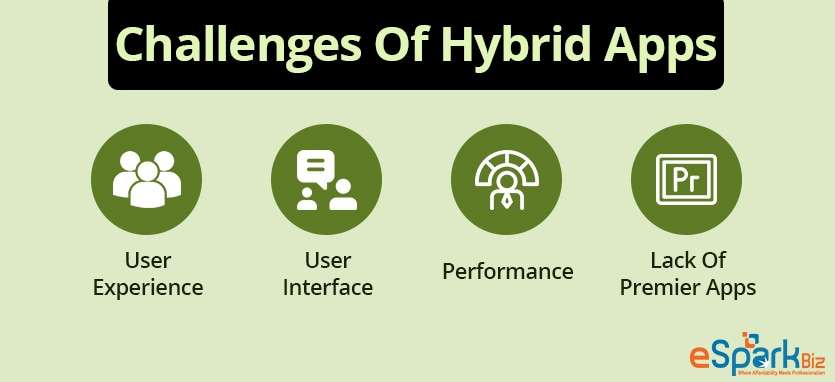We live in that digital era where technology change takes place within the blink of an eye. And when it comes down to apps, we are very much aware of the update notifications. Today, we will talk about React Native For Hybrid App Development.
This is an example of a dynamic transformation that this world is going through. Someone honestly said that it is especially important to learn the art of how to unlearn things to grow from where you are.
Hybrid Apps are the framework that is designed by the combination of web technology and native execution. Hire react native app developer who can develop such solutions for you.
They are the applications that are structured with the help of HTML5, CSS, and JavaScript and can easily run on Android as well as IOS devices through a native container.
Many apps were built through Hybrid formatting until React Native’s future came into existence, which gave the developers a new and easy way of programming and maintaining the application.
Similarity Between React Native & Hybrid Apps
React Native framework is just like the hybrid app framework. And when talking about something similar, it does not mean that they both are the same.
React Native provides similar cross-platform development as what the Hybrid application framework does. Instagram quoted that they are using 85-90% of their code what they used earlier when the application was not framed using react-native.
In addition to that, React Native is made using JavaScript, which many programmers are familiar with. The React Native Hybrid App is the most popular app until today.
Having a similarity between React Native and Hybrid app also gives relief to the people who don’t know how to create a Hybrid mobile app using the Native app.
Why React Native for Hybrid App Development?
Initially, for developing an application, one must adopt one for either building a hybrid app with HTML5 or coding for two different native apps, which performs the same tasks in Android and IOS. But now, things are not the same.
After the launch of React Native, things have become simple and convenient. And that’s why the below reasons will justify why React Native For Hybrid App development, is inclining us toward a react-native future.
Same Look & Feel as Native
Structuring an application through React Native will give you all the benefits of a hybrid app along with rectifying all the hindrances that a hybrid app has.
A Hybrid app is a web application that is molded in a native container to make it mobile-friendly, but it is not mobile-friendly. React Native does not deliver a web view and is perfectly suitable for mobile.
The main function of a native app is to provide the best User experience by having smoothness and compatibility to run on a mobile device. And that is what React Native helps the developers to do.
Shared Codebase Between Android & iOS
React Hybrid App has solved the earlier problem of writing different codebases for different platforms. React Native is truly a single codebase system that can be put to multi-use.
It helps to save the developers’ time that can be brought into distinct use and, at the same time, provides the users with a well-suited version of the application in their mobile phones.
Although since the functionality differs from platform to platform; therefore, some codes must be written according to platform specifications, 80% of the codebase is the same.
Programming Model Same as ReactJS
Since Facebook has created React Native, as well as ReactJS, React Native provides all the essential modules which ReactJS have. And ReactJS is one of the great libraries used by many developers when needed for web development.
Therefore, it also makes React Native one of the great tools when talking about mobile application development. So we can say that there is an underlying advantage for ReactJS developers to work in React Native.
Rich & Open Ecosystem
Since the release of React Native, there has been a wide transformation. Many industry giants have made their shift to React Native, especially because of its richness in a wide range of modules as well as free access.
Despite having various libraries before React Native, the developers face various challenges for coding their applications with better UX.
React Native has made things easy and less complex for the developers to make their move towards it. React Native Dimensions gives the benefit of making customization until and unless React Native supports it.
Part of many Tech Giants
It would be surprising to know that there are hardly any Hybrid apps present. Almost all the apps are made using React Native, to name a few, there is Facebook, Reddit, Netflix, Bloomberg, Discovery VR, and many more.
No company is ready to compromise on user interface because they know the key to survive in the market is to provide the best user experience, and that comes along with React Native.
The days of building apps on traditional hybrid app frameworks are no more. Now is the era of React Native until some mind-blowing technological advancement pops up.
Write everything in JavaScript: JavaScript is a simple language to inculcate and learn. It is easy to debug and test as well. And React Native is all about JavaScript; therefore, Developers find it easy to work with React Native.
JavaScript makes the work fast and simple for developers. Its lightweight nature with no compilation needed along with procedural programming capabilities makes JavaScript the only preferred choice for developers.
Reduce & Reuse
React Native is one of the best tools to create reusable components. As discussed above, a react native provides a single codebase for multiple platforms, which reduces work redundancy for the developers.
The reusable feature of React Native helps the developers in speedy development, launching and navigating the application along with improvising upon it from time to time. So, the React Native Future is bright.
Built for Mobile
For an application to be mobile friendly is the need of the hour, and therefore it makes React Native the best choice for any company to have it. React Native is especially for providing an assistant to mobile applications.
As more and more work is shifting towards mobile integrating people with convenience and fast growth, having a mobile-friendly application is very important. Almost every app is becoming a react hybrid app.
So, you need to have an idea of – How to Create Hybrid Mobile App Using React Native. It will surely help you in the long run.
Lots of Tools & Libraries
React Native is a significant tool to structure a mobile application. And the fact that it is beta testing proofed, it is one of the best solutions for any mobile application problem along with User Interface makes it popular among developers.
The cross-platform application development through React Native rather than going for the Hybrid app gives an edge to a company. React Native also provides multiple tools such as Integration libraries for Maps and Standard UI controls etc.
Reduced Cost & Time
The single source, which provides a solution to every mobile application problem, helps the developers to deliver their work on time.
And since its an open-source platform, one can easily access it for free, which makes it more attractive.
The surprising fact is that React Native reduces 33% of the time of the developers because of its single codebase, which can be used over different platforms.
Animations
The fact that many industry giants adopt React Native, especially social media sites is mainly because of its smooth animated components.
It helps to provide a great user experience ultimately improving the ratings and reviews about the apps. As everybody knows that visual aid is the best aid to showcase.
Hot Reloading
Hot Reload is one of the features in React Native, which updates the front-end application as soon as the application reloads after the back-end coding takes place. This eye-popping feature enables real-time updating of the UI component.
The developers can navigate and update the changes needed whenever they find something missing through making some changes in react-native JavaScript or code. This characteristic enables us to have a better glance at the transforming world we are living in.
Read also: 25 Of The Best React Native Open Source Apps & Projects
Ease Of Integration
React Hybrid App is great when it comes to synchronizing various applications. It reduces the programmer’s efforts to write special codes for integrating device applications such as Cameras, access to the gallery, GPS, and many more.
With this great benefit, it reduces the workload of the developer, along with making the application user friendly.
Community Support
React Native has a wide community with millions of developers. And it had gained this popularity since its existence when it came as an open-source version in 2015 on GitHub.
The fact that it has various features makes it a lot more valued on Stack Overflow with 88.2k stars on GitHub, 14.5k user subreddit, and 9000 user Discord chat.
Third-Party Plugin Compatibility
React Native has a varied range of third-party libraries that one can plug in whenever needed.
Although it has a small database library, it is fully functional and open-sourced through the third-party plugin. That is why the users find it convenient because they get access to a lot of data and modules for building their application.
Challenges With Hybrid Apps
Many challenges were faced by developers that made them bound to use React Native, or in other words, React Native App Examples had many advantages over general Hybrid apps.
User Experience
As technology is upgrading day by day, people are becoming more and more tech-savvy. They want everything to be systematic and less complex.
Therefore, the companies should understand that there are Nomophobia (smartphone addicts) whom they are dealing with, who want to use apps that have multiple features and are easy to access as they are the ones rating the apps. Hybrid app does not provide that experience to users.
User Interface
With the growing awareness and customers becoming more and more upfront about their perception of any product, it has become quite challenging for the developer to design impressive software that can be appreciated by many.
Whenever you download any application, the first thing you check is the images of the apps that are appealing enough or not, after which they scroll down to see the reviews. Hybrid Apps are the ones that do not help in making the app appealing for the users to like it at first glance.
Performance
Hybrid app’s performance has been in question for quite a long time. The poor offline support, frequent crashes, low speed, and poor network conditions are few of them.
The apps also generate bugs and low performance, making the app less user friendly. Moreover, Hybrid apps also take forever to open and get started sowing the seed of disappointment for the users.
Lack of Premier Apps
You might not have heard of any app that has moved from native to hybrid. Although certain apps have moved hybrid to native and to name a few, there is Bloomberg, Uber, Reddit, Discovery VR, etc., the list never ends.
The reason being, the premium quality which an app gets through native, is not available through the Hybrid platform.
Improvement in React Native Over Hybrid Apps
There are numerous challenges of hybrid apps that are overcome by react-native. One of the greatest challenges that React Native has overcome is the web-view.
React Native apps run natively, hence are not restricted to web-based UI elements. This makes the user experience quite comfortable.
Along with that, the React Native hybrid app also provides a single codebase with an User interface element, which cannot be experienced in other hybrid apps.
The UI element enables the front end of the application easy to use, making them comfortable at the initial stage of using it only. The developer’s experience is also improved through the react-native dimension.
Conclusion
React Native For Hybrid App is the new beginning giving an end to Hybrid apps because of its great features overcoming all the challenges that hybrid apps have been facing.
The growth that many industrial giants are experiencing is due to the React native application. The UI & UX that it provides cannot be compared to any other source that has been present.
Therefore, it can be said that React Native is the solution for all the Hybrid apps which are still existing, and we are heading toward the react-native future.
We hope you had a great experience reading this article and it proves to be of great value for any developer. Thank You.!
-
Can React Native Be Used For Web Apps?
Yes, it can happen indirectly, React Native is a mobile-specific framework. However, by using React Native Web Library, this is possible.
-
How To Create A Hybrid App Using React Native?
There are some steps that you need to follow while creating a hybrid app for react-native. They are as follows:
Download Expo on Mobile & Web
Create An App
Run The App on Expo client
Add Dependencies
Add Content & Functionalities -
Is Facebook a Native or Hybrid App?
Facebook is a hybrid app and it takes its basis on React Native.
-
Are Hybrid Apps The Future?
Hybrid apps allow you to save time, money, and effort. So, in the future, you will see a lot of companies adopting this approach to a great effect.







